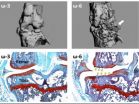(Press-News.org) Mice consuming a supplement of omega 3 fatty acids had healthier joints than those fed diets high in saturated fats and omega 6 fatty acids, according to Duke Medicine researchers.
The findings, published in the Annals of the Rheumatic Diseases (10.1136/annrheumdis-2014-205601) on July 11, 2014, suggest that unhealthy dietary fats – not just obesity – may contribute to worsening osteoarthritis.
"Our results suggest that dietary factors play a more significant role than mechanical factors in the link between obesity and osteoarthritis," said Farshid Guilak, Ph.D., Laszlo Ormandy Professor of Orthopaedic Surgery at Duke and the study's senior author.
Obesity is one of the primary risk factors for osteoarthritis, although the mechanisms linking these conditions are not fully understood. It has been assumed that increased weight wears the joints out, but this doesn't explain why arthritis is also found in hands and other joints that don't bear weight.
Guilak and his colleagues began studying systemic factors other than body weight to determine their effect on arthritis, and in an earlier study in obese mice, found that the lack of appetite hormone leptin predicted whether the mice had arthritis.
"This made us think that maybe it's not how much weight you gain, but what you eat," Guilak said.
In this study, the researchers focused on mice with osteoarthritis of the knee caused by injury to the joint. Arthritis resulting from trauma or injury is thought to account for 10 to 15 percent of all cases of arthritis.
The mice were fed one of three high-fat diets: one rich in saturated fat, one rich in omega 6 fatty acids, and one rich in omega 6 fatty acids but supplemented with a small amount of omega 3 fatty acids.
Saturated fat, which usually comes from animal sources, is known to raise cholesterol levels. Omega 6 fatty acids, often found in corn oil, soybean oil, nuts and seeds, are thought to be a healthier source of fat.
Omega 3 fatty acids, commonly found in fish or fish oil supplements, are often touted as "healthy fat" given their heart-healthy and anti-inflammatory properties. Unfortunately, most Americans eat significantly more saturated fat and omega 6 fatty acids than omega 3 fatty acids.
"A healthy diet would include roughly equal ratios of these fats, but we're way off the scale in the Western diet," Guilak said.
The researchers found that arthritis was significantly associated with the mice's diets, but not with body weight. The mice that ate diets high in saturated fat or omega 6 fatty acids experienced significant worsening of their arthritis, while mice consuming a small supplement of omega 3 fatty acids had healthier joints.
"While omega 3 fatty acids aren't reversing the injury, they appear to slow the progression of arthritis in this group of mice," Guilak said. "In fact, omega 3 fatty acids eliminated the detrimental effects of obesity in obese mice."
The researchers also looked at the mice's ability to heal wounds, which may help them to understand the relationships between arthritis and wound healing. In mice consuming omega 3 fatty acids, a small ear punch typically used to differentiate mice healed much more quickly than it did in animals that did not receive the supplement.
"We found that independent of body weight, dietary fatty acids regulate ear wound healing and severity of osteoarthritis following joint injury in obese mice," said Chia-Lung Wu, a biomedical engineering graduate student in the Duke Orthopaedic Research Laboratories and the study's lead author.
The researchers are working to translate their findings to humans.
"A great next step would be to do a clinical study to look at effect of omega 3 fatty acids post-injury," Guilak said.
INFORMATION:
In addition to Guilak and Wu, study authors include Deeptee Jain, Jenna N. McNeill, Dianne Little, John A. Anderson, Janet L. Huebner, Virginia B. Kraus, Ramona M. Rodriguiz and William C. Wetsel.
This study was supported by the National Institutes of Health (AR50245, AG15768, AR48852, AR48182, AG46927), a Taiwan GSSA graduate fellowship, the North Carolina Biotechnology Center and the Arthritis Foundation.
Omega 3 fatty acids lessen severity of osteoarthritis in mice
2014-07-11
ELSE PRESS RELEASES FROM THIS DATE:
'Tailored' water -- the latest in lawn care
2014-07-11
In Santa Fe, Albuquerque, and other major cities in New Mexico, nearly every public golf course is now watered with treated municipal wastewater rather than precious potable water supplies. Across the U.S. Southwest as a whole, more than 40% of all golf courses receive treated effluent. Reusing the effluent increases the sustainability of golf courses.
Additionally, golf courses and homeowners alike fertilize their lawns during the growing season. The major nutrient in fertilizer is nitrate. A New Mexico State University turfgrass expert has a new vision for even more ...
Non-invasive test could be used to predict premature birth and delivery of small babies
2014-07-11
Testing for the presence of specific molecules present in the urine of pregnant women can give an indication in early pregnancy of whether a baby will be born premature or the fetus will suffer poor growth, according to research published in the open access journal BMC Medicine. Identifying these conditions early in pregnancy could potentially help reduce complications and manage any difficulties, although more work is needed before the findings can be translated to clinical settings.
Researchers from Imperial College London and the University of Crete analyzed the metabolites ...
Women under-represented in academic medicine
2014-07-11
Women are under-represented in academic medicine resulting in a waste of public investment due to loss of research talent. Writing in the July issue of the Journal of the Royal Society of Medicine, authors of an essay on women and academic medicine say that as a consequence of female under-representation, some areas of medicine are under-researched at a cost to patients and society. Discriminatory practices and unconscious bias, they say, continue to occur in academic medicine, despite a substantial fall in traditional discrepancies between men and women in medicine in ...
Heart health benefits of light drinking brought into question
2014-07-11
A reduction in alcohol consumption, even for light-to-moderate drinkers, could be linked to improved cardiovascular health, including a reduced risk of coronary heart disease, lower body mass index and blood pressure, according to new research published in The BMJ.
These latest findings challenge the results of previous observational studies which found that the consumption of light-to-moderate amounts of alcohol (12-25 units per week) may have a protective effect on cardiovascular health.
The research, led by the London School of Hygiene & Tropical Medicine with University ...
Injected vaccine could help eradicate polio
2014-07-11
Re-introducing a type of polio vaccine that fell out of favour in the 1960s could hasten eradication of the disease, according to new research.
The study, by Imperial College London and the Christian Medical College in Vellore, India, suggests that the injected polio vaccine (IPV), which is rarely used today in countries affected by polio, could provide better and longer lasting protection against infection if used in combination with the more commonly used live oral polio vaccine (OPV).
The findings are published today in The Lancet.
Vaccination protects an individual ...
The Lancet: World's most advanced dengue vaccine candidate shows promise in phase 3 trial
2014-07-11
The first dengue vaccine candidate (CYD-TDV) to reach phase 3 clinical testing has shown moderate protection (56%) against the disease in Asian children, according to new research published in The Lancet.
Dengue is a mosquito-borne disease that infects around 390 million people each year, of whom about 96 million suffer from symptomatic infection. WHO estimates that the global burden of dengue has risen 30-fold over the past 50 years, with over half of the world's population at risk of the disease.
There is no licensed vaccine available to treat or prevent dengue ...
The Lancet: Extra dose of inactivated polio vaccine boosts immunity in children and could speed up global eradication efforts
2014-07-11
Giving children under 5 years old an extra dose of inactivated polio vaccine (IPV) helps to boost their immunity to the poliovirus and should be added to vaccination programmes in polio-endemic countries and those facing a high risk of imported cases, suggests new research published in The Lancet.
Lead author Dr Jacob John from Christian Medical College, India explains, "Adding a supplementary IPV dose to children already vaccinated with oral poliovirus vaccine (OPV) may hasten polio eradication by boosting herd immunity in endemic regions, act as a booster to prevent ...
The Lancet: Novel treatment for drug-resistant tuberculosis shows promise, but concerns for patient safety remain
2014-07-11
In a viewpoint published this week in The Lancet, the Community Research Advisors Group (CRAG) argue that research into bedaquiline – a new drug, fast tracked for multidrug-resistant tuberculosis (MDR-TB) – should proceed cautiously in people with drug-sensitive tuberculosis. CRAG, an international, community-based advisory board for the US Centers for Disease Control and Prevention's Tuberculosis Trials Consortium, writing in The Lancet independently, urge researchers to balance the goal of shortening treatment for drug-sensitive TB with patient safety.
Bedaquiline ...
Cost of expensive medication in dialysis catheters may be offset by reduced complications
2014-07-11
Washington, DC (July 10, 2014) — Using an expensive agent to prevent blood clots in kidney failure patients' dialysis catheters may turn out to be less costly overall due to its ability to reduce medical complications, according to a study appearing in an upcoming issue of the Journal of the American Society of Nephrology (JASN).
Recombinant tissue plasminogen activator (rt-PA) is a medication used to break up blood clots that occur in the vessels of patients having a heart attack. A recent clinical trial revealed that using rt-PA once per week plus the anticlotting agent ...
High stress, hostility, depression linked with increased stroke risk
2014-07-10
Higher levels of stress, hostility and depressive symptoms are associated with significantly increased risk of stroke or transient ischemic attack (TIA) in middle-age and older adults, according to new research in the American Heart Association journal Stroke.
A TIA is a stroke caused by a temporary blockage of blood flow to the brain.
Researchers investigated how psychological factors might influence risk for chronic disease, using data from the Multi-Ethnic Study of Atherosclerosis (MESA), an ongoing study on cardiovascular disease risk factors in participants living ...

